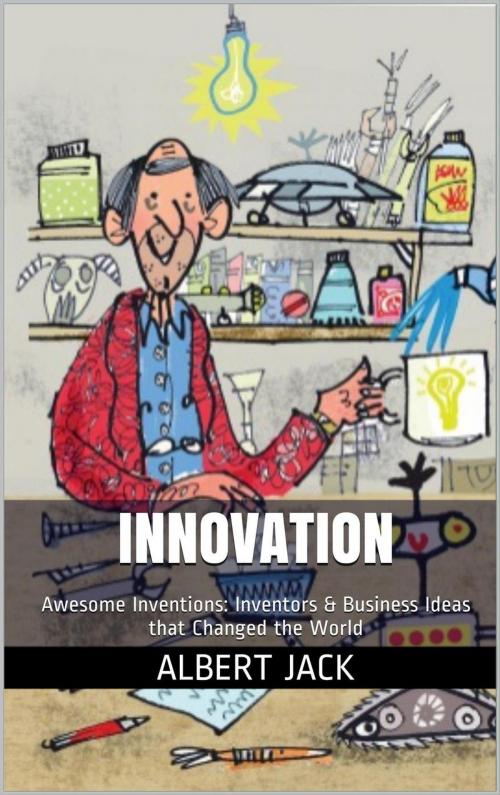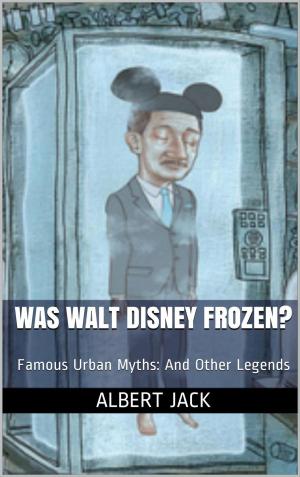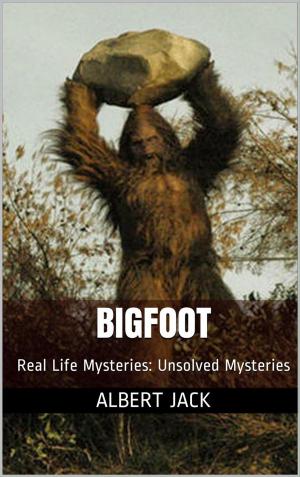| Author: | Albert Jack | ISBN: | 9781386854739 |
| Publisher: | Albert Jack Publishing | Publication: | March 5, 2018 |
| Imprint: | Language: | English |
| Author: | Albert Jack |
| ISBN: | 9781386854739 |
| Publisher: | Albert Jack Publishing |
| Publication: | March 5, 2018 |
| Imprint: | |
| Language: | English |
Introduction
Curiosity will eventually lead to innovation. Fortunately we are an imaginative species who does a lot of wondering.
Way back to when man first learned to walk upright and began communicating with each other, by pointing and shouting, we can find the earliest examples. Somebody once thought, ‘I know, we can move that heavy rock, or dead buffalo, by rolling it along on tree trunks because it is easier than dragging it over the ground.’
This, of course, led to the wheel. It must have been around that time that some other clever soul worked out that if he held some meat over that hot fiery thing then it tasted better. It seems basic but it was innovation. Somebody somewhere decided to take the risk of burning their food down into ashes, as they knew the burning logs did, just to see if it tasted any better. But I bet there was someone else laughing at him and saying ‘don’t do that, it’s a terrible idea,’ (or whatever is was they would have said back then.) And that’s innovation too. That’s discovery and invention.
We have been doing it ever since in one form or another and we have come a long way as a species thanks to people who take risks and ignore the advice of wiser ones. And that, in a nutshell, is what this book is all about. You see, that for all of our innovations and invention over the last six thousand years it is incredible to understand that the one thing that has not developed at all is the human brain.
Believe it or not the pre-historic human brain was perfectly capable of understanding how to use Windows 8.1 and could easily have landed a rocket on the moon if only the information it was given was better evolved at the time. The brain itself was already fine and all it needed was programming. That, of course, is what has happened to it over the many years since.
Man has programmed its brain to learn new and better ways of doing things. And curiosity has led it to evolve from pointing and shouting, fire and tree trunks into where we are now. It is curiosity that has led to invention and migration. ‘I wonder what is over that hill over there? There maybe be water, possibly better vegetation. Maybe there are more of those rabbit things we like to eat? Let’s go and have a look.’
More recently, in 1916 somebody said of the radio, ‘the wireless music box is of no imaginable commercial value. Who would pay for a message sent to nobody in particular?’
Well, that would have been a fair question at then but imagine a world without the radio. And the same was said of the television when it was dismissed as a novelty. ‘American families will not sit around staring at a plywood box for hours at a time.
How wrong can you be?
‘If the world should blow itself up, the last audible voice would be that of an expert saying, ‘It can’t be done.’ – Peter Ustinov
Introduction
Curiosity will eventually lead to innovation. Fortunately we are an imaginative species who does a lot of wondering.
Way back to when man first learned to walk upright and began communicating with each other, by pointing and shouting, we can find the earliest examples. Somebody once thought, ‘I know, we can move that heavy rock, or dead buffalo, by rolling it along on tree trunks because it is easier than dragging it over the ground.’
This, of course, led to the wheel. It must have been around that time that some other clever soul worked out that if he held some meat over that hot fiery thing then it tasted better. It seems basic but it was innovation. Somebody somewhere decided to take the risk of burning their food down into ashes, as they knew the burning logs did, just to see if it tasted any better. But I bet there was someone else laughing at him and saying ‘don’t do that, it’s a terrible idea,’ (or whatever is was they would have said back then.) And that’s innovation too. That’s discovery and invention.
We have been doing it ever since in one form or another and we have come a long way as a species thanks to people who take risks and ignore the advice of wiser ones. And that, in a nutshell, is what this book is all about. You see, that for all of our innovations and invention over the last six thousand years it is incredible to understand that the one thing that has not developed at all is the human brain.
Believe it or not the pre-historic human brain was perfectly capable of understanding how to use Windows 8.1 and could easily have landed a rocket on the moon if only the information it was given was better evolved at the time. The brain itself was already fine and all it needed was programming. That, of course, is what has happened to it over the many years since.
Man has programmed its brain to learn new and better ways of doing things. And curiosity has led it to evolve from pointing and shouting, fire and tree trunks into where we are now. It is curiosity that has led to invention and migration. ‘I wonder what is over that hill over there? There maybe be water, possibly better vegetation. Maybe there are more of those rabbit things we like to eat? Let’s go and have a look.’
More recently, in 1916 somebody said of the radio, ‘the wireless music box is of no imaginable commercial value. Who would pay for a message sent to nobody in particular?’
Well, that would have been a fair question at then but imagine a world without the radio. And the same was said of the television when it was dismissed as a novelty. ‘American families will not sit around staring at a plywood box for hours at a time.
How wrong can you be?
‘If the world should blow itself up, the last audible voice would be that of an expert saying, ‘It can’t be done.’ – Peter Ustinov















